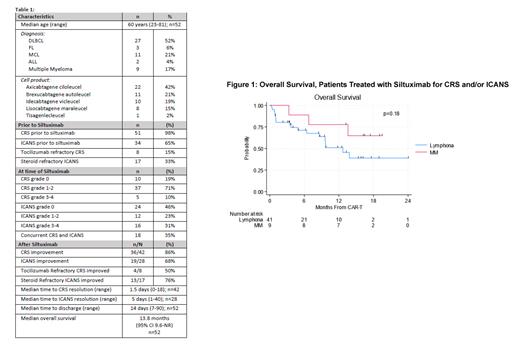Background: Chimeric Antigen Receptor T-Cell therapies (CAR-T) are effective in a variety of hematologic (hem) malignancies; however, adverse events including cytokine release syndrome (CRS) and immune effector cell-associated neurotoxicity syndrome (ICANS) can affect a significant number of patients (pts). Tocilizumab, a monoclonal antibody (mAb) binding the interleukin-6 (IL-6) receptor, is the standard of care for managing CRS, but is ineffective for ICANS. Corticosteroids remain the standard of care for managing ICANS. Pts who develop refractory CRS or ICANS have few treatment options. Siltuximab, a mAb binding circulating IL-6, has been proposed to have clinical activity in both CRS and ICANS (Patel, ASH, 2022; Narkhede, TCT, 2023). This study assesses the efficacy of siltuximab for managing CRS and ICANS in a real-world cohort from six academic medical centers.
Methods: We conducted a multicenter retrospective review of adult pts with hem malignancies treated with CAR-T therapy who received siltuximab for treatment of CRS and/or ICANS. Siltuximab administration occurred between January 2020 and August 2022. Pts who died within 48 hours of siltuximab administration (n=2) were excluded from this analysis. The co-primary endpoints were the percentage of pts who had improvement in CRS or ICANS after receiving siltuximab. Secondary endpoints included time to improvement of CRS or ICANS and overall survival (OS) from the date of CAR-T infusion. Time to event endpoints were evaluated by Kaplan-Meier methodology.
Results: Fifty-two pts were eligible and evaluated. The median age was 60 years (range 23-81). Diffuse large B-cell lymphoma was the most common hem malignancy (52%). Axicabtagene ciloleucel (42%) was the most common cellular therapy product. Table 1 describes disease subtypes and cell therapy products in detail.
Fifty-one pts (98%) developed CRS with median time to onset of 2 days (range 0-9). Max CRS grade prior to siltuximab administration was grade 1-2 in 83% and grade 3-4 in 15%. ICANS occurred in 65% with median time to onset of 6 days (range 0-16). Max ICANS grade prior to siltuximab administration was grade 1-2 in 29% and grade 3-4 in 37%. Prior to siltuximab, 52% of pts received tocilizumab with the majority (59%) receiving more than 1 dose, 69% of pts received corticosteroids, and 10 pts received additional treatments: anakinra (7/10 pts), LP with intrathecal (IT) chemo (3/10 pts), LP with IT steroids (2/10 pts), ruxolitinib (1/10 pt).
Reasons for siltuximab administration included steroid refractory ICANS in 17 pts (33%), tocilizumab refractory CRS in 8 pts (15%), tocilizumab shortage in 26 pts (50%), and non-steroid refractory grade 4 ICANS in 1 pt (2%). At the time of siltuximab administration, 42 pts (81%) had evidence of CRS (10% grade 3-4 CRS) and 28 pts (54%) had evidence of ICANS (31% grade 3-4 ICANS). 18 pts (35%) had concurrent CRS and ICANS.
Thirty-six pts (86%) had improved CRS grade following siltuximab treatment. The median time to CRS resolution after siltuximab was 1.5 days (range 0-18). Twelve pts with CRS received more than 1 dose of siltuximab. 4/8 pts (50%) with tocilizumab refractory CRS had improved CRS grade after siltuximab. Nineteen pts (68%) had improved ICANS grade following siltuximab treatment. The median time to ICANS resolution after siltuximab was 5 days (range 1-40). Nine pts with ICANS received more than 1 dose of siltuximab. 13/17 pts (76%) with steroid refractory ICANS had improved ICANS grade after siltuximab.
The median time to discharge after siltuximab administration was 14 days (range 7-90). CAR-T therapy objective response rate was 73% and complete response rate was 48%. Twenty-one pts had died at the time of data collection; 4 deaths were deemed secondary to CAR-T toxicity. The median OS was 13.8 months (95% CI 9.6-NR) and was not statistically different based on indication of CAR-T therapy, Figure 1.
Conclusions: To our knowledge, this is the largest cohort of pts treated with siltuximab for CRS and/or ICANS following CAR-T therapy. Half of the pts had CRS or ICANS refractory to tocilizumab and/or steroids. Siltuximab appeared to be effective for both CRS and ICANS, including refractory toxicities. These data support the use of siltuximab for refractory CRS and ICANS and warrant further investigation of siltuximab in earlier lines of therapy for CRS and ICANS management.
OffLabel Disclosure:
Lin:Biomarin: Current equity holder in publicly-traded company; Rigel Pharmaceuticals: Consultancy. Ghosh:Bristol-Myers Squibb, Kite, Takeda, Fate, Atara, Incyte, Miltenyi.: Research Funding. Ahmed:Kite, a Gilead company: Research Funding; Bristol Myers Squibb: Consultancy. Maakaron:CLBR: Research Funding; CRISPR: Research Funding; FATE Therapeutics: Research Funding; Atara: Research Funding; Gilead: Research Funding; Precision Biosciences: Research Funding. de Lima:AbbVie: Other: Data Safety Monitoring Board; Novartis: Other: Data Safety Monitoring Board; Miltenyi Biotec: Research Funding; Bristol Myers Scribb: Membership on an entity's Board of Directors or advisory committees; Pfizer: Membership on an entity's Board of Directors or advisory committees. Epperla:Merck: Consultancy, Honoraria, Membership on an entity's Board of Directors or advisory committees; Novartis: Consultancy, Honoraria, Membership on an entity's Board of Directors or advisory committees, Speakers Bureau; ADC Therapeutics: Consultancy, Honoraria, Membership on an entity's Board of Directors or advisory committees; Incyte: Speakers Bureau; Beigene: Research Funding, Speakers Bureau; Lilly: Consultancy, Honoraria, Membership on an entity's Board of Directors or advisory committees. Caimi:Lilly Oncology: Consultancy; BMS: Consultancy; Novartis: Consultancy; SOBI: Honoraria; Genentech: Consultancy; ADC Therapeutics: Consultancy; Kite Pharma: Honoraria. Voorhees:AstraZeneca: Research Funding; Incyte: Research Funding; Morphosys: Research Funding; Recordati: Consultancy, Research Funding; Novartis: Consultancy.
Treatment of cytokine release syndrome and immune effector cell-associated neurotoxicity syndrome with siltuximab, an IL-6 binding antibody, is off-label.


This feature is available to Subscribers Only
Sign In or Create an Account Close Modal